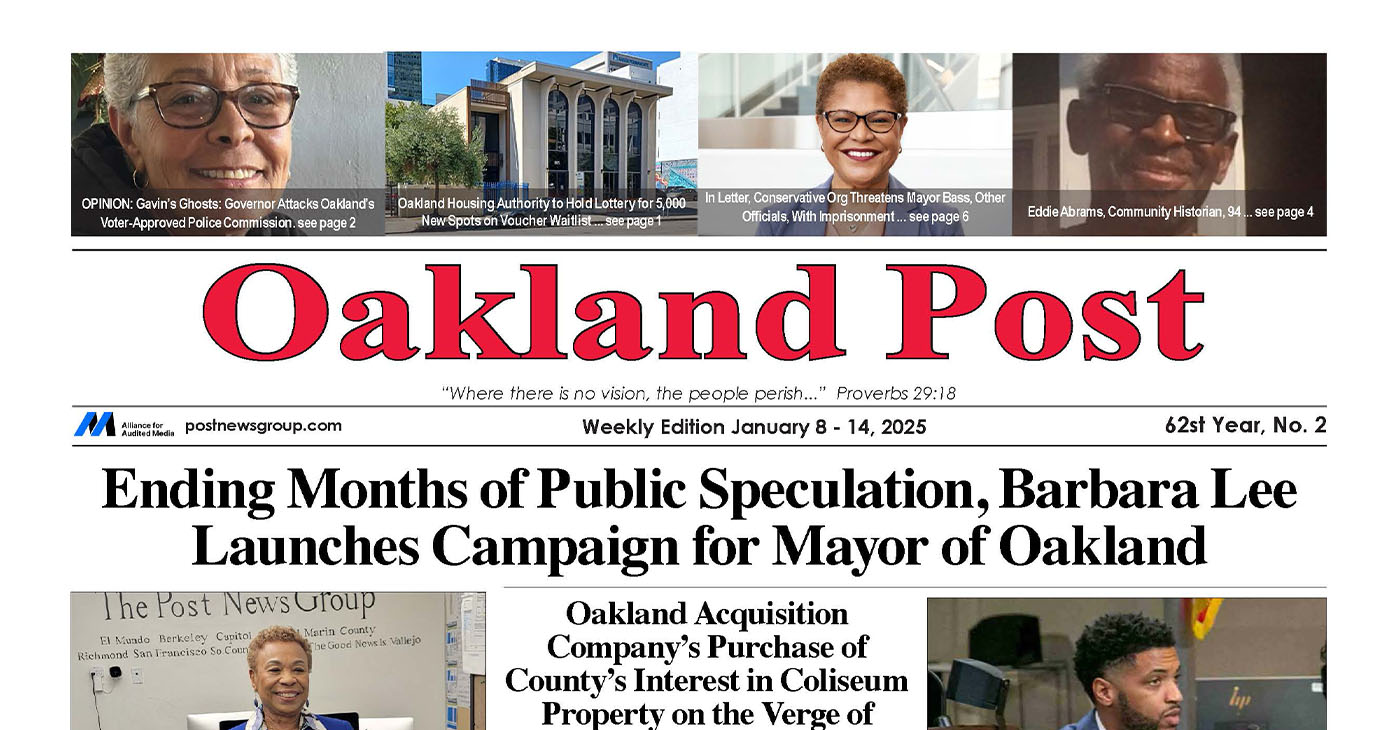Activism
Advocates to Gov. Newsom: Racial Disparities Are a Public Health Crisis
“The biggest hardship that we’re facing right now is really getting the governor to support investments to community-based organizations to focus on health equity and racial justice interventions within healthcare,” said Ron Coleman, the managing director of policy for the California Pan-Ethnic Health Network (CPEHN).

Some health advocates are calling on Gov. Gavin Newsom to treat health inequity in California as a public health crisis – one that is complicated by racism.
Their appeal to the governor comes as California state officials propose a $115 million investment in the state’s budget for the next fiscal year to address health disparities. If approved, some of the money would fund programs administered by community-based organizations.
“The biggest hardship that we’re facing right now is really getting the governor to support investments to community-based organizations to focus on health equity and racial justice interventions within healthcare,” said Ron Coleman, the managing director of policy for the California Pan-Ethnic Health Network (CPEHN).
Coleman said the state needs to make new investments in public health that will remedy the social determinants that worsen health disparities in the healthcare system.
In the revised May budget, Newsom proposed a $115 million annual grant program for health equity and $200 million for local health infrastructure. He also included $15 million in funds to support underprivileged lesbian, gay, bisexual, transgender, and queer (LGBTQ) people.
Despite the plan to increase spending on leveling the playing field in health care, a dozen community-based organizations want Newsom to do more. In addition to CPENH, other organizations include the Asian Pacific Partners for Empowerment, Advocacy and Leadership (APPEAL), Black Women for Wellness Action Project, California Black Health Network, California Black Women’s Health Project, California Latinas for Reproductive Justice, Latino Coalition for a Healthy California, Public Health Advocates, Public Health Institute, Roots Community Health Center, and Roots of Change.
The leaders of these organizations are asking the state to expand support for health programs with funds from California’s budget surplus that are targeted to addressing health disparities that impact vulnerable populations, including low-income Black and Brown families.
In the May budget revisions, “There was absolutely no new investment in the budget for public health, whether it’s the infrastructure, workforce, health equity racial justice, or prevention,” said Coleman.
Coleman specified that the money Newsom is allotting for health equity should go to community-based organizations, particularly for racial justice interventions in the healthcare system.
“We need Governor Newsom to begin treating racism as a public health crisis and make the investments in the community that will help us reduce healthcare disparities and improve health outcomes,” said Coleman.
Newsom said that the state has partnered with multiple community-based organizations for public outreach and vaccine pop-up sites. The state has also collaborated with “influencers” to implement earned and paid media strategies to counter misinformation related to COVID-19.
However, health advocates are wary about the efficacy of the state’s public health messaging campaigns as a means to reduce health disparities in ethnic communities that were the most impacted by the COVID-19 pandemic.
Coleman said that public health messaging is a promising start. But ethnic communities still need better access to health care.
“It’s great that they’re utilizing trusted messengers to disseminate information, but the state should actually be making an investment to support these organizations in helping to advance the improvements of health outcomes,” said Coleman.
Community-based organizations have been trusted messengers for the government through the pandemic. Although COVID-19 exposed health inequity, health disparities existed in ethnic communities prior to the pandemic.
A public proposal to the governor health advocates from a dozen community-based organizations stated that receiving government funds is a once-in-a-lifetime opportunity that can dismantle structural racism in California’s healthcare system.
Health advocates stressed that social determinants are major contributors to health disparities that widen the gap of inequality in healthcare. The advocates encouraged the state to prioritize social determinants including, food and housing security, childcare, and environmental justice, as defined by the California Department of Public Health.
According to the recommendations provided by the dozen organizations, the state should implement innovative approaches to achieving health inequity. They include:
- Partnerships between cities and community advocates to develop community participatory budgeting processes.
- Disaggregation of data on race/ethnicity to better understand variation in health risks and outcomes.
- Creating and cultivating racial justice training for government leaders and policy makers so that decisions and program implementation reflect community priorities and advance racial equity.
The recommendations proposed by leaders of the dozen organizations, aim to secure adequate funding for initiatives led by community-based organizations, local clinics, and tribal organizations. The leaders say they plan to use the funds to implement, monitor, and evaluate programs that promote racial justice and health.
California Black Media’s coverage of COVID-19 is supported by the California Health Care Foundation.
Activism
Oakland Post: Week of January 8 – 14, 2025
The printed Weekly Edition of the Oakland Post: Week of January 8 – 14, 2025

To enlarge your view of this issue, use the slider, magnifying glass icon or full page icon in the lower right corner of the browser window.
Activism
Barbara Lee Launches Campaign for Mayor of Oakland
“At this critical moment, we must not be a city divided, but a community united,” she Lee. “If elected I will bring my hands-on leadership, new ideas and decades of experience in identifying billions in resources for our great city, so all residents and businesses are stronger and safer and our community has optimism and confidence in Oakland’s future.”

By Post Staff
Barbara Lee on Wednesday morning formally announced her candidacy for Mayor in Oakland’s April 15 special election.
“Time and time again, Oaklanders have faced our toughest obstacles by uniting to meet our challenges,” said Lee.
“At this critical moment, we must not be a city divided but a community united,” she said. “If elected, I will bring my hands-on leadership, new ideas, and decades of experience in identifying billions in resources for our great city so all residents and businesses are stronger and safer and our community has optimism and confidence in Oakland’s future.”
“As Mayor, I’ll address our homelessness crisis, prioritize comprehensive public safety and mental health services, and lead with fiscal responsibility to deliver the core City services residents and business owners deserve. Let’s do this – together.”
“I’ve never shied away from a challenge,” said Lee. “I’m always ready to fight for Oakland.”
Watch her campaign video here, which is online at BarbaraLee4Oakland.com
Activism
Who Wants to Be the Next Elected Mayor of Oakland?
The Oakland Post is issuing a CALL to all candidates to present their answers, plans, or solutions in response to our list of questions.

By Paul Cobb
Many of you probably recall the oft-repeated expression when describing leadership that “many are called but few are chosen.” We will be inundated during January with many claims of qualifications by those who want to lead Oakland.
As of Jan. 1, 2025, we have heard the names of 14 potential candidates who might become Oakland’s next Mayor.
The Oakland Post is issuing a CALL to all candidates to present their answers, plans, or solutions in response to our list of questions.
Any candidate who wishes to receive a free announcement, publicity or space in the paper must submit solutions.
- The first questions we propose are 1) What is your budget balancing plan?
- What is your position on requiring all city employees to work full-time in their designated offices rather than remotely from their homes?
- What is your plan to provide open-access opportunities to all police officers for overtime pay?
- Since many businesses, especially downtown, have closed, what is your plan to attract and increase revenues?
Please send your submissions of 300 words or less to each question to Social@postnewsgroup.com or visit www.postnewsgroup.com
-

 Activism3 weeks ago
Activism3 weeks agoBooks for Ghana
-

 Arts and Culture4 weeks ago
Arts and Culture4 weeks agoPromise Marks Performs Songs of Etta James in One-Woman Show, “A Sunday Kind of Love” at the Black Repertory Theater in Berkeley
-

 Bay Area3 weeks ago
Bay Area3 weeks agoGlydways Breaking Ground on 14-Acre Demonstration Facility at Hilltop Mall
-

 Activism4 weeks ago
Activism4 weeks ago‘Donald Trump Is Not a God:’ Rep. Bennie Thompson Blasts Trump’s Call to Jail Him
-

 Activism3 weeks ago
Activism3 weeks agoLiving His Legacy: The Late Oscar Wright’s “Village” Vows to Inherit Activist’s Commitment to Education
-

 Arts and Culture3 weeks ago
Arts and Culture3 weeks agoIn ‘Affrilachia: Testimonies,’ Puts Blacks in Appalacia on the Map
-

 Alameda County3 weeks ago
Alameda County3 weeks agoAC Transit Holiday Bus Offering Free Rides Since 1963
-

 #NNPA BlackPress4 weeks ago
#NNPA BlackPress4 weeks agoCalifornia, Districts Try to Recruit and Retain Black Teachers; Advocates Say More Should Be Done



















































